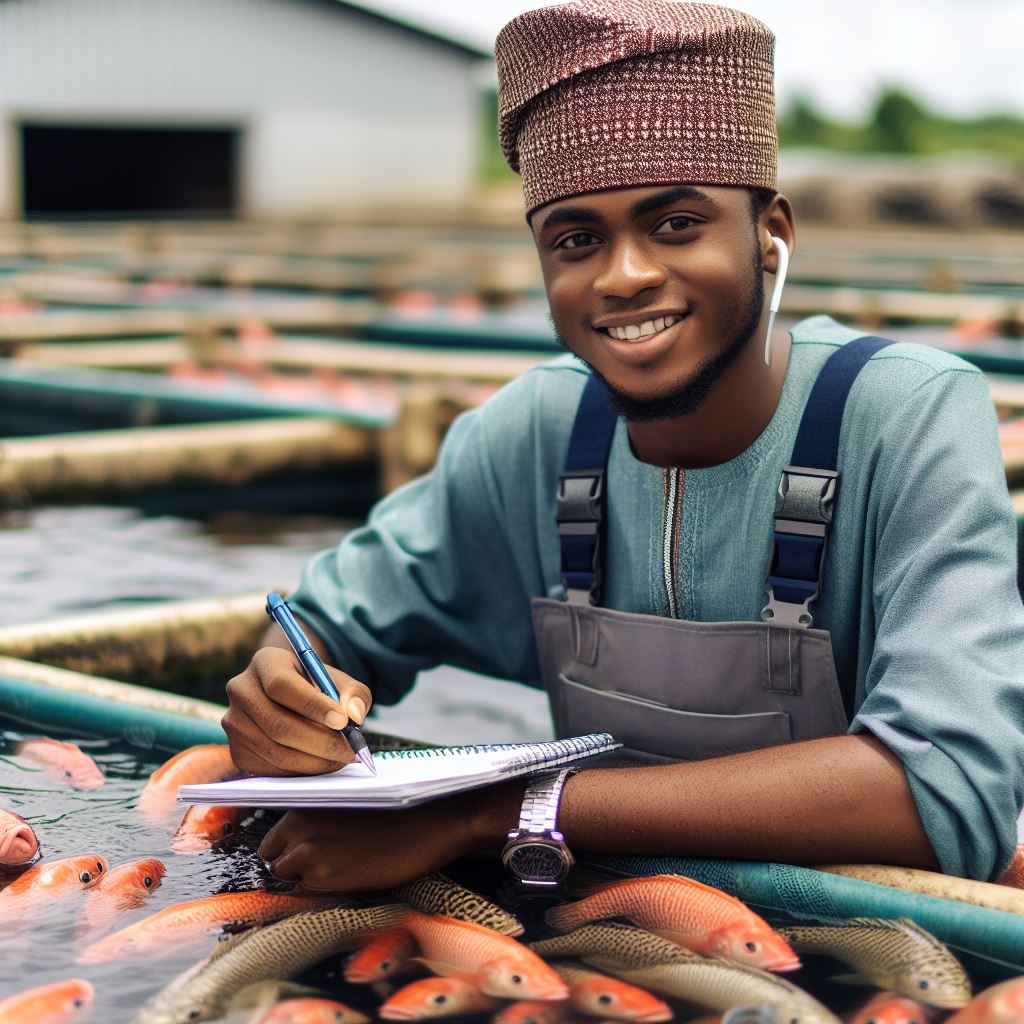Introduction
In this blog post, we will explore Fisheries Curriculum Nigeria vs Global Standards.
Fisheries education forms the bedrock of sustainable aquatic resource management, pivotal to Nigeria’s economic stability.
A robust curriculum equips learners with skills crucial for thriving within this vital sector.
Nigeria’s economy heavily relies on fisheries, contributing significantly to food security and livelihoods nationwide.
The fisheries sector employs millions and supports coastal communities, underscoring its socio-economic significance.
However, the effectiveness of Nigeria’s fisheries curriculum in preparing individuals for this industry remains a subject of scrutiny.
This blog aims to dissect and compare Nigeria’s fisheries education against global benchmarks.
By delving into the intricacies of the Nigerian fisheries curriculum, we aim to highlight areas of strength and potential shortcomings.
Comparisons against global standards will provide insights into where improvements or adjustments might be necessary.
The purpose of this blog is twofold: firstly, to underscore the pivotal role of fisheries education in Nigeria’s economic landscape.
Secondly, to scrutinize Nigeria’s fisheries curriculum through a comparative lens against international standards.
Through this comparative analysis, we seek to identify areas for enhancement in the local curriculum.
Assessing global standards offers a benchmark for aligning Nigeria’s fisheries education with contemporary industry demands.
This exploration isn’t about mere criticism; it’s an opportunity to foster growth and development within Nigeria’s fisheries education.
By drawing parallels with global standards, we aim to pave the way for a more robust and globally competitive curriculum.
The subsequent chapters will delve deeper into the specifics, examining curriculum structure, content, practical applicability, and industry alignment.
Stay tuned to unravel the nuances shaping Nigeria’s fisheries education against global paradigms.
Overview of Nigeria’s Fisheries Curriculum
In Nigeria, the fisheries curriculum offered in universities and colleges focuses on providing students with a comprehensive understanding of the fishing industry and its related fields.
Current Fisheries Curriculum in Nigerian Universities and Colleges
The fisheries curriculum in Nigerian universities and colleges consists of various subjects and areas of focus.
- Basics of Fisheries: Students are introduced to the fundamental concepts and principles of fisheries.
- Marine Biology: This subject covers the study of marine organisms and their ecosystems.
- Aquaculture: Students learn about the farming and breeding techniques of aquatic organisms.
- Fishery Management: This subject focuses on the sustainable management of fishery resources.
- Fish Processing and Preservation: Students are taught the techniques for processing and preserving fish.
- Fisheries Economics: This subject covers the economic aspects of the fishing industry.
- Environmental Science: Students learn about the environmental impact of fishing activities and how to mitigate them.
- Research Methodology: This subject equips students with research skills necessary for the fisheries field.
- Fisheries Policy and Law: Students study the legal and policy frameworks governing fisheries.
- Fisheries Extension: This subject focuses on transferring knowledge and technology to fishermen and fish farmers.
Key Subjects and Areas of Focus in the Curriculum
The key subjects and areas of focus in Nigeria’s fisheries curriculum revolve around fisheries management, aquaculture, marine biology, and sustainable fishing practices.
The curriculum aims to equip students with the necessary skills and knowledge to contribute to the sustainable development of the fishing industry in Nigeria.
Challenges and Shortcomings of the Current Curriculum
While the current fisheries curriculum in Nigeria provides a solid foundation, there are certain challenges and shortcomings that need to be addressed.
- Limited Practical Components: The curriculum lacks sufficient practical components to enhance hands-on skills.
- Inadequate Industry Exposure: Students often have limited exposure to real-world industry practices, hindering their practical understanding.
- Outdated Content: The curriculum needs to be continually updated to align with global trends and advancements in the fisheries field.
- Insufficient Research Emphasis: There is a need for increased focus on research, innovation, and technology transfer in the curriculum.
- Inadequate Collaboration and Partnerships: Collaboration between academic institutions and industry stakeholders needs improvement to bridge the gap between academia and industry.
Efforts should be made to address these challenges and shortcomings in the fisheries curriculum, ensuring that it remains relevant and prepares students for the evolving needs of the industry.
In fact, Nigeria’s fisheries curriculum covers a wide range of subjects and areas of focus, aiming to provide students with a strong foundation in fisheries management, aquaculture, and marine biology.
There is a need to address certain challenges, such as limited practical components and outdated content, to enhance the curriculum’s effectiveness and relevance.
Read: Addressing Climate Change: The Role of Crop Protection in Nigeria
Global Standards in Fisheries Education
Overview of global standards and best practices in fisheries education
In order to ensure that fisheries education programs are effective and produce competent professionals, global standards have been established.
These standards aim to provide guidance for the development and implementation of fisheries curricula that meet the needs of the industry and promote sustainable practices.
Countries or regions recognized for their excellent fisheries education programs
Recognizing the importance of fisheries education, several countries and regions have been acknowledged for their excellent fisheries education programs.
These programs have been successful in producing graduates who possess the necessary knowledge and skills to contribute to the sustainable management of fisheries resources.
Developing countries, like Nigeria, can benefit greatly from adopting global standards in fisheries education.
By aligning their curricula with these standards, they can ensure that their graduates are competitive in the global job market and contribute to the sustainable development of their fisheries resources.
By benchmarking against countries or regions recognized for their excellent fisheries education programs, Nigeria can identify best practices and incorporate them into their own curriculum.
This can help address any gaps or weaknesses in their current fisheries education system and enhance the quality of education provided.
Key components of a strong fisheries curriculum according to global standards
Key components of a strong fisheries curriculum according to global standards include:
- A broad foundation: A strong fisheries curriculum should provide students with a solid understanding of the basic principles and concepts of fisheries science and management.
- Practical skills development: In addition to theoretical knowledge, fisheries education programs should place a strong emphasis on developing practical skills that are relevant to the industry.
- Field experience: Hands-on experience through internships or fieldwork is essential for students to apply their theoretical knowledge and develop practical skills.
- Interdisciplinary approach: Fisheries education programs should adopt an interdisciplinary approach that integrates knowledge and perspectives from various fields, such as biology, ecology, economics, and policy.
- Collaboration and partnerships: Collaboration with industry stakeholders, research institutions, and government agencies can enhance the relevance and quality of fisheries education programs.
With these key components in place, fisheries education programs can produce graduates who are well-equipped to address the complex challenges facing the industry.
It is important to note that while global standards provide a useful framework, they should not be seen as rigid guidelines.
Each country or region should adapt and tailor their fisheries curriculum to suit their unique needs and local context.
This flexibility allows for the incorporation of cultural, social, and economic factors that may influence fisheries management practices.
In short, global standards in fisheries education provide a valuable guide for the development of strong and effective curricula.
Transform Your Career with Expert Guidance
Get personalized mentorship consulting that’s tailored to your unique path. Our expert advice is actionable and exclusive.
Get StartedBy following these standards, countries like Nigeria can enhance the quality of their fisheries education programs and produce graduates who can contribute to the sustainable management of fisheries resources.
Read: Modern Trends in Nigerian Aquaculture: A University Perspective

Gap Analysis: Nigeria’s Fisheries Curriculum vs. Global Standards
In today’s globalized world, it is essential for countries to align their educational curricula with international standards to ensure their students are competitive in the global workforce.
The fisheries sector, a vital industry for Nigeria, is no exception to this rule.
In this blog essence, we will conduct a gap analysis between Nigeria’s fisheries curriculum and global standards, subject by subject, to identify potential areas of improvement or misalignment.
Comparing Nigeria’s Curriculum with Global Standards
Subject 1: Marine Biology
Nigeria’s curriculum covers the basic concepts of marine biology, including the classification of marine organisms and their habitats.
There is a lack of emphasis on current research and technologies, which are crucial for understanding and managing marine ecosystems in the global context.
Subject 2: Fishery Economics
Nigeria’s curriculum provides a solid foundation in fishery economics, addressing topics such as supply and demand, pricing, and market analysis.
It fails to address emerging trends in the global fishery market, such as sustainable fishing practices and market diversification.
Subject 3: Aquaculture
The curriculum adequately covers the basics of aquaculture, including fish breeding and rearing techniques.
It overlooks the importance of sustainable aquaculture practices, such as disease prevention, water quality management, and the use of eco-friendly feeds, which are emphasized in global standards.
Subject 4: Fisheries Management
Nigeria’s curriculum provides a comprehensive understanding of fisheries management principles, including stock assessment and regulations.
It lacks practical training in implementing effective management strategies, such as ecosystem-based approaches and community-based management, widely practiced in the global fisheries industry.
Potential Areas of Improvement or Misalignment
Based on the comparison, it is evident that Nigeria’s fisheries curriculum falls short in incorporating essential aspects emphasized in global standards.
The curriculum needs to be updated to include:
- Current research and technologies in marine biology to understand and manage marine ecosystems effectively.
- Emerging trends in the global fishery market to prepare students for evolving industry demands.
- Sustainable aquaculture practices to promote environmental responsibility and long-term industry growth.
- Practical training in implementing effective fisheries management strategies to ensure sustainable resource utilization.
Implications of the Gaps in Nigeria’s Fisheries Education
The gaps in Nigeria’s fisheries education curriculum have significant implications for the industry and national economy.
Without aligning with global standards, Nigeria may face the following consequences:
- Decreased competitiveness: Nigerian fisheries professionals may struggle to compete in the global job market due to the lack of exposure to current industry practices.
- Declining sustainability: Without incorporating sustainable practices, the fisheries industry may face overexploitation and environmental degradation, negatively impacting fish stocks and ecosystem health.
- Missed economic opportunities: Failure to adapt to emerging trends and market demands may result in missed economic opportunities for Nigeria, such as value-added fish products and international trade.
- Limited international collaboration: Misalignment with global standards may hinder international collaboration and partnerships in research, technology transfer, and policy development.
In general, a thorough gap analysis between Nigeria’s fisheries curriculum and global standards highlights the need for improvement and alignment.
Nigeria must update its curriculum, integrating current research and practical fisheries management training for industry advancement.
This step ensures global competitiveness and sustainable growth.
It is imperative for educational policymakers and stakeholders to address these gaps and empower Nigeria’s fisheries students to thrive in the international arena.
Read: Modern Technologies Enhancing Crop Protection in Nigerian Agriculture
Uncover the Details: How to Start a Career in Seed Science in Nigeria
Initiatives and Efforts to Improve Nigeria’s Fisheries Curriculum
When it comes to the fisheries curriculum in Nigeria, there have been several ongoing initiatives and efforts to enhance its quality and align it with global standards.
These initiatives aim to equip Nigerian students with the necessary skills and knowledge to thrive in the fisheries industry.
Collaborations with international institutions have played a crucial role in improving the standards of Nigeria’s fisheries curriculum.
Ongoing Initiatives and Efforts
One notable initiative in Nigeria is the establishment of specialized fisheries training centers across the country.
These centers focus on providing practical training to students, ensuring they have hands-on experience in various aspects of fisheries.
By incorporating real-life scenarios and practical exercises, these centers aim to bridge the gap between theory and practice.
Another ongoing effort is the development of a standardized curriculum.
Various stakeholders, including government agencies and industry professionals, work together to review and revise the curriculum to ensure it meets global standards.
This collaborative approach ensures that the curriculum reflects the latest trends and advancements in the field of fisheries.
Collaborations with International Institutions
To further improve the fisheries curriculum in Nigeria, collaborations with international institutions have been established.
Through these partnerships, Nigerian students and faculty members have the opportunity to engage in exchange programs, research collaborations, and capacity-building initiatives.
For example, some Nigerian universities have partnered with renowned fisheries research institutions in Europe and North America.
This collaboration allows Nigerian students to benefit from the expertise and resources available at these international institutions.
Faculty members also have the opportunity to participate in research projects and conferences, keeping them up-to-date with the latest developments in the field.
In addition to academic collaborations, international organizations provide technical assistance to Nigeria in curriculum development.
Experts from these organizations offer guidance on curriculum design, teaching methodologies, and the integration of practical skills into the curriculum.
This support helps ensure that the fisheries curriculum in Nigeria is in line with global best practices.
Impact and Effectiveness
The initiatives and collaborations aimed at improving Nigeria’s fisheries curriculum have made a significant impact on its quality.
Students who have gone through the revised curriculum and practical training in specialized centers have demonstrated enhanced skills and knowledge in the fisheries sector.
By aligning the curriculum with global standards, Nigerian graduates are better prepared to compete internationally.
Employers both within and outside Nigeria acknowledge the improved quality of graduates, making them more marketable and increasing their chances of securing employment.
The collaborations with international institutions have also contributed to the overall development of the fisheries sector in Nigeria.
The research collaborations and capacity-building initiatives have propelled advancements in fisheries sciences and technologies, benefiting both academia and industry.
It is important to continuously assess and evaluate the effectiveness of these initiatives to ensure sustained improvement.
Feedback from students, faculty, and industry professionals should be actively sought to identify areas for further enhancement and address any challenges that arise.
In review, Nigeria has taken significant steps to improve its fisheries curriculum through ongoing initiatives and collaborations with international institutions.
These efforts have resulted in a more practical and globally aligned curriculum, equipping Nigerian students with the necessary skills for success in the fisheries industry.
Read: Career Prospects After Studying Fisheries in Nigerian Universities
Recommendations for Enhancing Nigeria’s Fisheries Curriculum
Specific measures and strategies to bridge the gaps between Nigeria’s curriculum and global standards
- Suggest the revision of existing fisheries curriculum to align with global standards.
- Include courses on sustainable fishing practices, aquaculture, and fisheries management.
- Introduce practical training programs to expose students to real-life fishing scenarios.
- Create research opportunities for students to conduct studies on local fish species and their habitats.
- Encourage collaboration between educational institutions and the fishing industry to provide internship opportunities for students.
- Strengthen partnerships with international universities to exchange knowledge and expertise in fisheries education.
- Promote the use of advanced technology in fisheries education, such as remote sensing and fish tracking systems.
- Incorporate entrepreneurship and business skills into the curriculum to prepare students for self-employment in the fisheries sector.
- Organize field trips to fish farms, fish processing plants, and fishing communities to provide practical learning experiences.
Importance of Incorporating Practical Training, Research Opportunities, and Industry Collaboration
Practical training is essential to equip fisheries students with the skills required in the industry.
By incorporating hands-on experiences, students can learn about different fishing techniques and understand the challenges faced in the field.
Moreover, research opportunities allow students to contribute to the advancement of fisheries science and develop innovative solutions for sustainable fisheries management.
Industry collaboration is crucial as it provides students with exposure to industry professionals and their expertise.
Through internships and industry partnerships, students can gain valuable insights into the practical aspects of the fisheries sector, such as fish processing, marketing, and policy development.
Collaboration also allows for the exchange of knowledge and experiences, benefiting both the industry and educational institutions.
Significance of Government Support and Investment in Fisheries Education
Government support and investment in fisheries education are of paramount importance for the development of a robust and globally competitive curriculum.
Adequate funding should be allocated to improve infrastructure, update teaching materials, and provide training programs for faculty members.
Scholarships and grants should also be made available to encourage students to pursue fisheries education and research.
Government support should extend beyond financial assistance.
Policies should be developed to promote sustainable fishing practices, protect fish habitats, and regulate the fishing industry.
Government and educational institutions collaborating can align the curriculum with priorities for sustainable fisheries sector development. This collaboration ensures alignment.
In a nutshell, enhancing Nigeria’s fisheries curriculum requires specific measures and strategies.
Nigeria can enhance its fisheries sector by aligning the curriculum with global standards, involving practical training, research, and industry collaboration.
With government support and investment, well-rounded fisheries professionals can contribute to sustainable management.
Conclusion
This blog post has highlighted the key points regarding the comparison between Nigeria’s fisheries curriculum and global standards.
It is evident that Nigeria’s fisheries curriculum needs continuous improvement to meet global standards.
However, there is a positive outlook for the future development of fisheries education in Nigeria,
as the country recognizes the importance of aligning its curriculum with global standards.
With dedicated efforts and ongoing improvements, Nigeria can ultimately enhance its fisheries education and contribute to the global fisheries industry.
Despite the challenges, the future of fisheries education in Nigeria remains bright.
The dedication of educators, the growing awareness of sustainability, and the unwavering passion of students create a fertile ground for positive change.
By embracing innovation, fostering collaboration, and prioritizing continuous improvement.
Let us all work together to ensure that the vast potential of Nigeria’s fisheries sector is realized, ensuring food security, empowering communities, and safeguarding the health of our oceans for the future.




